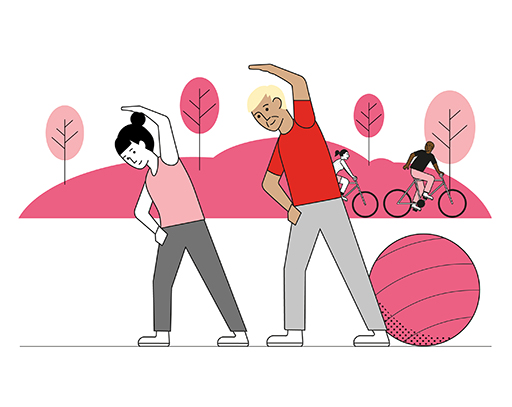3.3 Physical activity: getting plenty of exercise
Regular exercise not only helps you feel more energised, it also offers a number of health benefits:
- Cutting your risk of many long-term conditions, including heart disease, stroke, type 2 diabetes, dementia, Alzheimer’s disease and some cancers.
- Managing any physical or mental health conditions you might be dealing with.
- Boosting your body and brain function by pumping more oxygen into your system. This is important as the brain consumes around 20% of the body’s oxygen.
- Improving your sleep, building up your energy levels and helping you feel less stressed.
- Maintaining good bone and joint health, and staying at a healthy weight.
When you’re juggling work, home life and other responsibilities, it’s all too easy to let exercising regularly drop down your priority list. Make sure you choose an exercise that you enjoy. That way you’re far more likely to keep it up longer term, becoming part of your routine. But your regular exercise doesn’t have to be something like running, swimming or going to the gym. Just keeping moving will help. You could use the stairs rather than the lift, take the dog for an extra walk or get off the bus or train one stop early. Even just getting outside for a short time can be very good for both your physical and mental wellbeing. Set yourself targets and see how you improve over time.
Ideally, you should exercise for 20 to 30 minutes, five times a week. It doesn’t have to be all at once – you can break it down into five to ten minute bursts of activity, a few times a day. The World Health Organization (WHO) recommends 150 minutes per week as a minimum, but, if you haven’t been exercising much recently, you can build up to this over time. And if you’re new to exercise you may want to check with your doctor before you take on anything strenuous.
You can get some ideas for building exercise into your daily life on the NHS Website [Tip: hold Ctrl and click a link to open it in a new tab. (Hide tip)] . It covers everything from how much exercise is best for your age group to taking on a challenge: Couch to 5k.
Try this activity to help you think about your daily routine and see how you could be more active.
Activity 3: Fitting more exercise into your daily routine
Think about your daily routine. Can you challenge yourself to be physically active every day?
- Plan activities that improve strength, balance and flexibility at least twice a week.
- Set yourself daily step goals. Your smart phone can help you count and compare them.
- If you’re not very active, build up to at least 150 minutes of moderate intensity aerobic activity each week.
- If you’re already quite active, see if you can add an extra 75 minutes of vigorous intensity activity to whatever you’re already doing.
- Try to spend less time sitting or lying down. See if there are daily tasks you can do while standing up. Break up long periods of not moving with some sort of physical activity.

